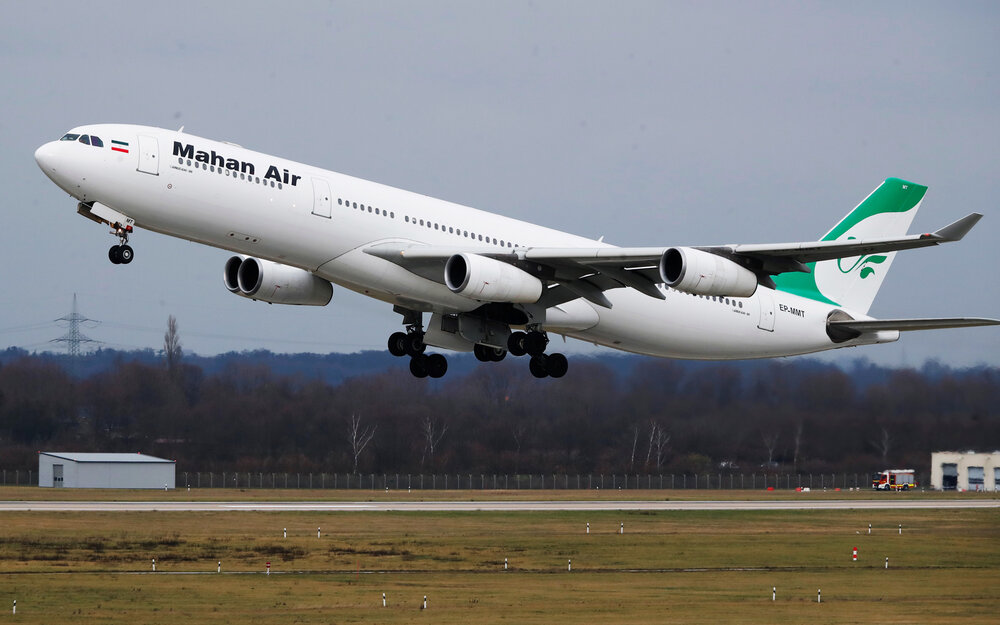Why U.S. planned to deceive Syrian air defenses into targeting Iranian plane

TEHRAN - The U.S. army’s fighter jets intercepted a Mahan Air’s flight over Syria to deceive the Syrian air defense systems into shooting down the Iranian plane or to create conditions for the plane to crash itself, Iranian experts and officials say.
Two U.S. fighter jets conducted dangerous maneuvering near Mahan Air’s passenger plane over Syria on Thursday, forcing the pilot to suddenly lower the altitude, a move that shocked the passengers on board and led to many injuries. Iran has strongly condemned the U.S. move, calling it an “act of terror.”
On the other hand, the U.S army’s Central Command (CENTCOM) claimed in a statement that a U.S. F-15 fighter jet on a “routine air mission” over Syria conducted a “standard visual inspection” of the Iranian plane “at a safe distance of approximately 1,000 meters from the airliner.”
Iran has firmly rejected CENTCOM’s claim, suggesting the U.S. warplanes were pursuing malicious undeclared goals during their interception of the passenger plane.
“Unlike what the spokesman of this organization [CENTCOM] said, the U.S. F-15 fighter jets was not on a routine air mission, and they intercepted the Iranian passenger plane by violating Lebanese airspace,” the Nournews agency quoted an unnamed Iranian official as saying on Sunday.
The official also said that the U.S. interception of the Iranian plane occurred while the plane was lowering altitude near Beirut’s airport.
Iran also called into question the U.S. account of the incident.
6 minutes of harassment
While CENTCOM said that only a single U.S. fighter jet had conducted the visual inspection, Iran announced that at least two fighter jets were involved in the Thursday incident. Citing informed sources, Press TV reported on Sunday that “U.S. warplanes” have harassed the Iranian plane “two times in six minutes during the Thursday terrorist incident.”
According to the Press TV sources, the first harassment occurred when the airliner was flying over Syria’s al-Tanf region, a strategic border triangle shared by Iraq, Syria, and Jordan. The U.S. has a garrison there.
“The second instance of harassment took place over the Syrian-Lebanese border,” the network quoted the sources as saying.
It also said that the U.S. warplanes involved in the harassment took off from al-Azraq air base in Jordan, adding that the base is presumably the same base from which a U.S. drone took off to assassinate IRGC Quds Force Commander Lt. Gen. Qassem Soleimani near Baghdad’s International Airport on January 3, 2020.
While the U.S. said its fighter jet was at a safe distance from the Iranian plane during the alleged inspection, Iranian media has said that the U.S. warplanes were so close to the plane that the pilot was forced to quickly lower the altitude to avoid collision with the warplanes.
“The pilot of the airliner was forced to drop altitude to avoid collision with U.S. warplanes over the Syria-Lebanon border,” the informed sources told Press TV.
Two TCAS alerts
Iranian officials say the U.S.'s main goal of harassing the passenger plane was to create conditions for a possible error.
Parliament Speaker Mohammad Bagher Ghalibaf said in a tweet on July 24 that the Iranian plane had received two traffic collision avoidance system (TCAS) alerts during the Thursday encounter with the U.S. warplanes.
TCAS alert is a system specifically designed to reduce the incidence of mid-air collisions between aircraft.
“In a call with Mahan’s operations officer, I followed up on the American terrorists’ last night adventurism. The Americans lyingly say that they were flying in the standard and regular maneuvering path, but the pilot has received TCAS alert twice due to U.S. warplanes exceedingly approaching above and below the plane,” the speaker tweeted.
Ghalibaf further said, “The American terrorists attempted to achieve their ominous, planned goals by creating conditions for a possible error.”
The senior lawmaker warned, “Any crime by the Americans will expedite the humiliatory destruction of the region’s arrogance, especially the ominous Zionist regime.”
American maliciousness
Ghalibaf didn’t elaborate on the “possible error.” But Nournews speculated that the U.S. may have been trying to repeat the Russian Il-20 plane crash scenario, which was accidentally shot down by Syrian air defense systems in mid-September 2018.
In September 2018, Syrian air defenses mistakenly shot down the Russian military aircraft over Latakia province. Fifteen Russian troops were killed in the incident. Although the Syrian air defenses fired at the Russian plane, Russia blamed Israel for the incident, because Israeli fighter jets attacked Syrian facilities in Latakia province while the Russian plane was returning to Russia's Hmeimim airbase near the north-western city of Latakia.
Nournews said that the Americans may have sought to conduct a similar operation.
“It seems that the U.S. warplanes have maliciously flown close to the Iranian passenger plane to make the Syrian air defense systems [mistakenly] shoot it down,” said the news website.
According to the website, American fighter jets sought to hide behind the Iranian plane to deceive the Syrian air defense systems into targeting it, but the pilot’s dexterity thwarted the American maliciousness.
It’s not clear how the U.S. would have taken advantage of the plane crash if it had been shot down by the Syrian air defenses. But some analysts believe that the U.S. would have mobilized the public against Iran’s influence in Syria.
“If this disaster had occurred, it’s clear what would have happened between us and Syria. Some people would have said ‘you see, the Syrians killed our children and shot down our passenger plane. Therefore, we should withdraw our troops from Syria.’ In fact, this would have played into the hands of the U.S. and Zionist regime,” the Fars news agency quoted Seyyed Hadi Seyyed Afqahi, a West Asia expert, as saying on Sunday.
SM/PA
